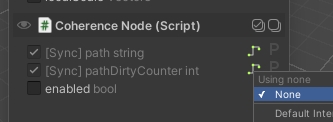
Common problems and how to fix them
When binding a byte[] field, the field will not be synced when changed by someField[x] = y.
The only way to actually update the field, is through someField = new byte[]... which assigns a new reference.
We have identified a misprediction bug in coherence 1.1.3 and earlier versions that causes a failed rollback right after a new Client joins a session, throwing relevant error messages. However if the Client manages to connect, this won't affect the rest of the simulation. The fix should ship in the next release.
If you're getting errors such as the ones below, the issue is that your Prefab has multiple AnimationControllers, but coherence only supports a single AnimationController.
Parameter 'Hash 1963678224' does not exist.
CoherenceSync: We can't find any binding for component 'GenericFieldQuaternion0' when receiving a component update.
If you still need multiple AnimationControllers, a workaround is detailed in the Animations article.
Or see an error on saving a Prefab from the sample:
Delete the sample itself (mind any modifications you might have done), close Unity and delete the Library folder. Note that by doing so you're forcing a reimport of all your assets, which might take time depending on your project size.
When using CoherenceNode on your CoherenceSync, if CoherenceNode's networked variables have interpolation applied, you'll experience this issue. Turn off interpolation for such variables.
This can happen if coherence fails to set a Unique ID on your scene instances. Check the CoherenceSync inspector on Prefab instances. Look for Prefab Instance Unique ID. Click the button to generate an ID. Do this for every Prefab instance that is missing its ID.
Alternatively, you can set a Manual Unique ID of your own on the Prefab itself or per-Prefab instance on your scene.
ExtensionOfNativeClass attributeReimport assets via menu item Assets / Reimport All.
There is a bug in some early versions of Unity 2022 LTS that causes Prefabs to be corrupted on reimport, leading to all sorts of issues like scripts losing references, or the CoherenceSync component showing a button to "Fix Serialized Data" (which cures the problem, but only temporarily).
The real solution is to upgrade to a newer version of Unity 2022. Unity claims they fixed the bug in version 2022.3.5f1 (note the specific patch number, .5).
The current workaround to avoid this issue is to open your CoherenceSync Prefabs in Prefab mode.
Check that all your Clients are using the same Schema ID.
When working with Prefab Variants, Unity leaks managed references (fields marked with [SerializeReference]). This can make your Prefab grow big and use more memory than necessary. Until Unity fixes this issue, we provide you with the ability to prune the leaked references. You can prune within the Configure window.
If you are instantiating a Prefab from a coherence event (such as a Command, OnValueSynced, OnStateAuthority, OnLiveQuerySynced...) and then changing its bindings in the same frame, the remote Clients will not instantly get updated values. Instead, if the binding has interpolation enabled, the value of the binding will be interpolated from the original value (from the instantiation step) to the updated value (from the change later in the frame).
The current recommended workaround is to make sure that the Prefab has initial values set before instantiation. Or in the case of position and rotation, those could be directly supplied to Instantiate() instead of setting them later in the frame.
If you see this message, the CoherenceSync Prefab instance has been modified to point to the correct archetype name. If that's the case, select every CoherenceSync Prefab instance on your scene(s) to make sure this fixup happens. Even if you don't see the message, you're good to go. Make sure you save your project (Ctrl+S) to apply the changes (if any) to disk.
Make sure you allow HTTP connections in Editor to avoid InvalidOperationException: Insecure connection not allowed errors. Find out how to enable HTTP connections in Unity's InsecureHttpOption article.


